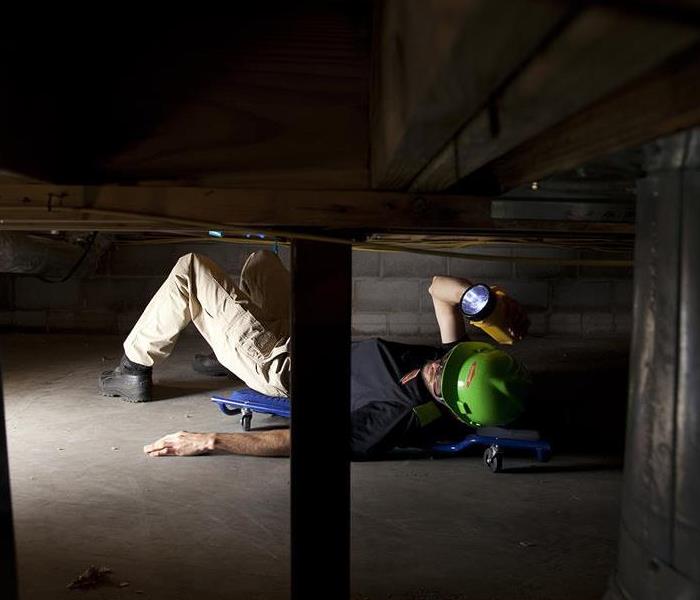Park Cities SERVPRO Offers Mold Remediation Services
5/1/2020 (Permalink)
Summary: SERVPRO of Park Cities remediates mold issues and restores the area to normal, natural mold levels that are safer and more healthy.
Mold is present almost everywhere. Microscopic mold spores float along in the air and can enter a house through windows, doors, and HVAC systems. Clothing and pets also transport mold. Mold can begin to cause health effects when spores are exposed to moisture and grow into colonies.
Homeowners should beware of restoration businesses that guarantee to remove all mold since it is technically impossible to remove every spore of mold from a home or business. However, mold colonies can be remediated, and the moisture that causes colonies to form can be addressed.
Five Common Types of Mold
- Cladosporium
Often found on dead or live plant material, this type of mold lives both outside and inside homes. It is usually dark green, brown, or black in color. It grows on damp wallpaper, HVAC insulation, wet carpet, and acrylic painted walls.
- Trichoderma
Trichoderma is most commonly found in forests, wood, and soil. It can make its way into the home, especially where water damage has occurred. This type of mold can also be brought indoors by way of surfaces that come in contact with it outdoors before entering the home, such as clothing, shoes, and pets.
- Penicillium
While some species of Penicillium have greatly benefited the world, this fungus can have health effects if found in large quantities in the home. Penicillium can be found growing on fruits and vegetables or living on walls, carpets, or furniture. This mold species is often easy to identify since it can be either yellow, green, or blue in color.
- Stachybotrys Chartarum
More commonly known as “black mold,” mold growth from this type of fungus is often found in HVAC systems and other areas with consistent moisture. It can be either green or black in color and has an identifiable musty smell that can lead homeowners to growing colonies.
- Aspergillus
High humidity levels can cause this common type of mold to be found in the home. One variety of Aspergillus called Aspergillus fumigatus is often found in pillows.
While these five types of mold are some of the most common, there over 10,000 different species of mold.
Most people are not bothered by exposure to mold spores, but a small percentage experience health effects. If there are large mold colonies growing in a home, the homeowner may want to bring in a mold remediation specialist for mitigation services that will restore more normal mold levels.
Before mold remediation can begin, any sources of water or moisture must be addressed. According to the Texas Department of State Health Services, “Mold thrives in continuously wet conditions and can start to grow within 24 hours after a flood.” If the water damage or moisture buildup is not resolved first, the mold may return. Because mold spores thrive on moisture, homeowners need to remember that even higher-than-normal indoor humidity can support mold growth. Keep indoor humidity below 45%.
A qualified restoration company understands the science behind mold and mold growth, and a skilled team has the training and expertise to remediate mold colonies in a home or business. The technicians at SERVPRO of Park Cities are the experts in mold mitigation and remediation. As IICRC certified professionals, they are trained to target and resolve any mold outbreak. The team includes an Applied Microbial Remediation Specialist, a Water Damage Restoration Technician, and an Applied Structural Drying Technician.
While every scenario is different and requires a unique solution, the general mold remediation process proceeds as follows:
- Emergency Contact
- Inspection and Mold Damage Assessment
- Mold Containment
- Air Filtration
- Removing Mold and Mold-Infested Materials
- Cleaning Contents and Belongings
- Restoration
Because of the integral role water plays in mold colony growth, the initial focus is to stop the source of water feeding the mold. Then, SERVPRO isolates the affected area using a negative air pressure chamber. The team engages in ongoing mold remediation training and invests in the latest equipment to better serve clients.
For more information about mold remediation, call SERVPRO of Park Cities at (214) 522-3000.






 24/7 Emergency Service
24/7 Emergency Service
